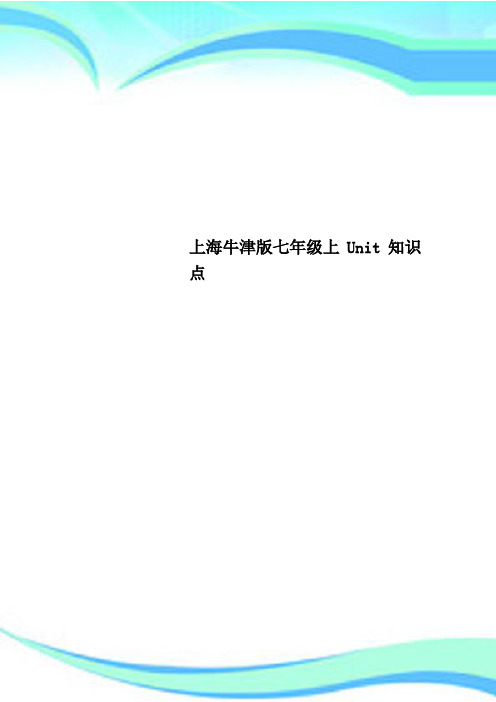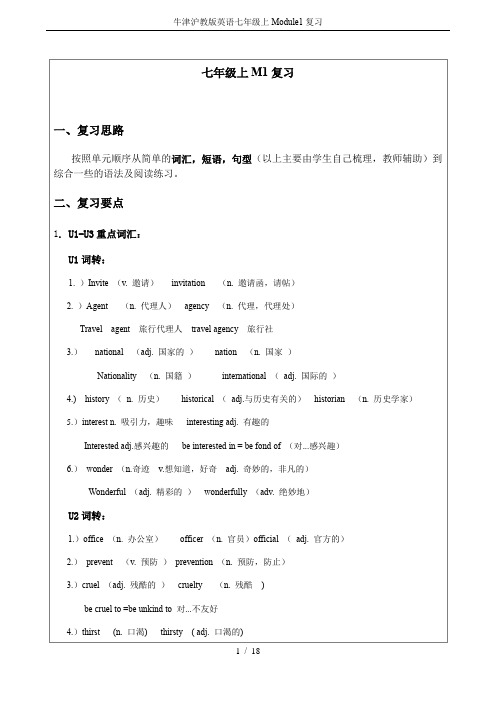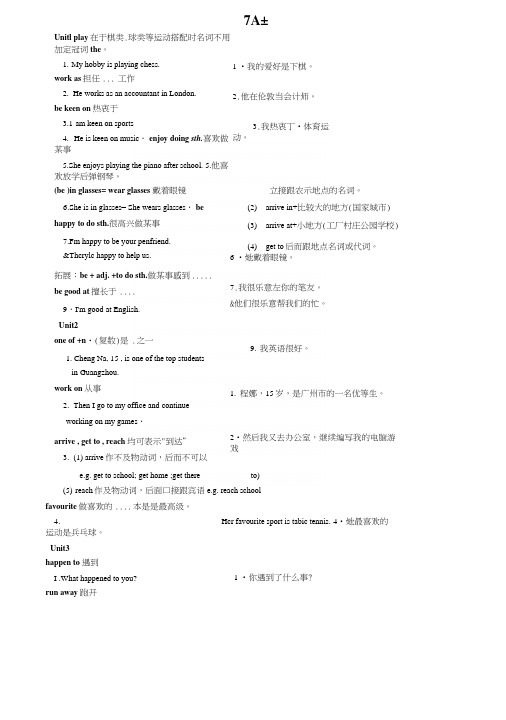英语(上海牛津版)复习资料『七年级上』
上海牛津七年级上Unit知识点

上海牛津版七年级上Unit知识点————————————————————————————————作者:————————————————————————————————日期:博轩教育英语牛津上海版7A Unit4 Seasons编者:张素恒一、Words and expressions1、favourite=like…best2、complete=finish e.g. complete the poem 完成这首诗3、footprint(s) sandy footprints 沙中脚印make footprints in the snow 踏雪4、puddle(s) 水坑5、kick(ed) e.g.He kick the door hard.6、during e.g. People usually spend time with their relatives duringthe Spring Festival.7、Everything=all the things Everybody=all the people8、Send out light=shine9、quite quite different二、Phrases in common use1、in different parts/areas of the world 世界各国2、talk about sth=discuss about sth3、get warm;get angry;get cold turn green;left;right; 变得…4、blow gently 轻轻吹5、fall from The leaves start falling from the trees.6、go on a picnic=go for a picnic=go to have a picnic7、cool and dry干燥凉爽cold and snowy冰天雪地8、spend time with sb=stay with sb=play with sb9、go on a trip=go for a trip=travel to…10、put sth in the correct order11、turn sth into sth turn A into B12、(be)get married with sb=marry sb三、Sentence patterns1、Which seasons do you like best? I like…best.2、How many/much(数量);How often(频率,多少次);How long(时间长度);How soon(多久之后);How far(距离,多远);How deep(深度)How long…? How long have you been a teacher? 3 years.How soon…? How soon will you go aboard?(出国) 3 months later.3、What is the weather like?=How is the weather?4、It is +adj. for sb to do sth. E.g. It’s frightening for me to walk alone instreet at night.5、四、GrammarThe usage of adjective(形容词用法)一、形容词(词组)作名词修饰语绝大多数形容词既能作名词修饰语,又能作补语,例如:The boy is intelligent.(作补语)He is an intelligent boy.(作名词修饰语)His life is very happy.(作补语)He lives a very happy life.(作名词修饰语)注意:某些作补语的形容词词组转化为前置修饰语时不可按原来的“修饰语+形容词中心语”的次序出现。
牛津上海版七年级英语上册Unit1-2重点知识复习及强化练习

——Yes, I used to.(No,I usedn't.) 是的,经常打。(不,不常打。)
二、区分 be used to 与 used to
1、be used to 意为“习惯于”,其中的 to 是介词,所以其后要接名词或动名词(不能接动词原形);若要强调 从不习惯到习惯的过程,可用 get, become 等代替动词 get, become be。如:
He is used to looking after himself. 他已习惯于自己照顾自己。
I’m sure I’ll get used to the hard work. 我相信我会习惯这艰苦工作的。
2、used to 意为“过去经常”,其中的 to 是不定式符号,而不是介词,所以其后只接动词原形(不能接动名 词)。如: He used to live in Paris. 他过去一直住在巴黎。
Did you use to go swimming in the river when you were young? 你小时候经常在河里游泳吗?
Used he go to school by bike? 他过去骑车上学吗?
4、used to 用于省略句时,肯定式保留 to,否定式不保留 to。例如:
convenient
choose a flat in the center of have a nice view face
19. I want to ________ ________New York.
20. Let's ________ all the things we are going to buy.
牛津沪教版英语七年级上Module1复习

七年级上M1复习一、复习思路按照单元顺序从简单的词汇,短语,句型(以上主要由学生自己梳理,教师辅助)到综合一些的语法及阅读练习。
二、复习要点1. U1-U3重点词汇:U1词转:1. )Invite (v. 邀请)invitation (n. 邀请函,请帖)2. )Agent (n. 代理人)agency (n. 代理,代理处)Travel agent 旅行代理人travel agency 旅行社3.)national (adj. 国家的)nation (n. 国家)Nationality (n. 国籍)international (adj. 国际的)4.) history (n. 历史)historical (adj.与历史有关的)historian (n. 历史学家)5.)interest n. 吸引力,趣味interesting adj. 有趣的Interested adj.感兴趣的be interested in = be fond of (对...感兴趣)6.)wonder (n.奇迹v.想知道,好奇adj. 奇妙的,非凡的)Wonderful (adj. 精彩的)wonderfully (adv. 绝妙地)U2词转:1.)office (n. 办公室)officer (n. 官员)official (adj. 官方的)2.)prevent (v. 预防)prevention (n. 预防,防止)3.)cruel (adj. 残酷的)cruelty (n. 残酷)be cruel to =be unkind to 对...不友好4.)thirst (n. 口渴) thirsty ( adj. 口渴的)5.)love (n. 爱) lovely ( adj. 可爱的)6.)care (n.照顾) careful (adj. 小心的) carefully ( n. 小心地)Careless (adj. 粗心的) carelessness ( n. 粗心)7.) safe (adj. 安全的) save (v.拯救)safely (adv. 安全地) Safety (n. 安全)8.)police n.警方policeman n.警察policewoman n. 女警察9.) miss v.思念,错过missing adj. 失踪的10.)hunt v. 猎取hunter n. 猎人U3词转:1.)foreign adj.外国的foreigner n. 外国人2.)crowd n.人群crowded adj. 拥挤的be crowded with 挤满...3.)weigh v-weight n. 称v. -重量n.high a-height n 高的a. -高度n.4.)Germany –German(s) 德国-- 德国的,德国人Canada - Canadian(s)加拿大- -加拿大人America-American(s)美国- -美国人Britian - British 英国- - 英国人India -Indian (s)印度- -印度人Australia -Australian(s)澳大利亚- - 澳大利亚人Japan-Japanese 日本--日本人China - Chinese 中国--中国人2. U1-U3重点短语:at the SPCA 在动物保护协会cruel – cruelty 残忍be cruel to sb. 对..残忍.prefer A to B = like A better than B 比起B来更喜欢Aprefer doing A to doing B 比起做B来更喜欢做Aprefer – preferred 更喜欢prefer …= like… better 更喜欢…be in danger 处于险境be dangerous to 对...危险care for = take care of =look after 照顾,照看don’t need to do sth. / needn’t do sth. / don’t have to do sth. 不必做某事be kind to sb. be unkind to sb. 对…和蔼可亲对…不友善help sb. do sth. / help sb. with sth. 帮助某人做某事promise (not) to do sth. 承诺(不)做某事help sb. by doing sth. 通过做某事来帮助某人raise money for … 为…筹钱be useful to ... 对…有用in different ways 用不同的方法on the farm 在农场save v. –safe a. –safely ad. – safety n. 挽救v. 安全的a. 安全地ad. 安全n. take care of = look after=care for 照顾keep warm 保暖need to do sth. 需要去做某事否定句don’t need to doBe kind/friendly to sb 对…友好hold …..carefully with both hands 用双手小心地抱着buy sth for sb 为某人买某物save animals from danger 拯救动物免受危险help sb do sth 帮助某人做某事sick animals 生病的动物keep people safe from danger 保护人们安全免受危险hunt animals for food 猎杀动物获取食物should do 应该做某事on their farms 在他们的农场里bring sth to sb 把某物带给某人be crowded with / be filled with / be full of 挤满了,充满了read about sth. 阅读与…有关的…know about sth. 了解…19. be interested in 对…感兴趣make friends with … 和…交朋友like doing sth. / enjoy doing sth. / be interested in doing sth. 喜欢做某事tell sb. about sth. 告诉某人某事look forward to doing sth. 盼望做某事hear from sb. = get a letter from sb. = receive a letter from sb. 收到某人的来信most of 大多数near = close to 在…. 附近far away from = far from 远离ride bicycle 骑自行车enjoy yourself = have a good time 玩得愉快Help yourself to sth 随便吃……be crowded with 挤满crowd 人群call sb. sth 把某人称作… be near… 靠近be far (away) from…远离write (a letter) to sb. 写信给某人know about 了解know 知道show interest in… interest n. 兴趣3. U1-U3重点语法点:现在完成时:一、定义:表示过去发生或已经完成的某一动作对现在造成的影响或结果。
沪教牛津版英语七年级上册知识点总结

Unit 11来自be from=come from2和...住在一起live with...3靠近.. close to=near4艺术老师an Art teacher5姐姐an elder sister6乘车上学go to school by bus / take a bus to school7 擅长be good at doing sth. = do well in doing sth.8交朋友make friends with...9来自世界各地的朋友people from all over the world =around10 发邮件给某人email sb.11 离...很远far away from....12 .....的意思是the meaning of . (13)在某人的空余时间in one’s free time14 …的答案是the answer to …15 一个德国女孩a German girl16 在互联网上on the Internet17 放风筝fly a kite / fly kites18 收到某人来信hear from sb= receive / get a letter from19 最美好祝愿best wishes20 许多朋友a lot of / lots of / many friends21 洗澡take a bath22 想做某事would like to = want to … 23 你多大了?What’s your age?/ How old are you?24 完成complete=finish4. work as + 职位名称作为…而工作6. walk to school=go to school on foot 走路去上学7. be keen on (doing) sth=be interested in 对….感兴趣8. enjoy (doing) sth= like doing sth 喜欢做某事9. reply to sb回信给某人11. a photo of 一张…的图片13. speak Chinese 说中文15. in the middle 在中间20. write to sb写信给某人,注意pay attention to 以…开始begin with 参考书reference book语法1:特殊疑问词及其引导的特殊疑问句(what, where, when, how, why, which)What refers to things.对事物提问(什么)(可以用来询问职业) Where refers to places.对地点提问(在哪里)Who refers to persons.对人提问(谁)How refers to ways.对年龄提问(多大年纪,几岁)How old refers to ages.对某人或情况提问(怎么样)When refers to times.对时间提问(何时)what time (只能用来问具体几点钟)Why refers to reasons.对原因提问(为什么)which refers to kinds (种类).对事物或人称提问(哪一个,哪一位)How many refers numbers.对数量提问(多少)How old ...多大年纪How often ... 多经常,多久一次How far... 多远How long ... 多长时间How soon 多快,多语法2:不定冠词的用法不定冠词有a和an两个,仅用在单数可数名词前。
英语(上海牛津版)复习资料『七年级上』.docx

Unitl play 在于棋类.球类等运动搭配时名词不用加定冠词the 。
1. My hobby is playing chess. work as 担任 ... 工作2. He works as an accountant in London.be keen on 热衷于3.1 am keen on sports4. He is keen on music ・ enjoy doing sth.喜欢做某事5.She enjoys playing the piano after school. 5.他喜欢放学后弹钢琴。
(be )in glasses= wear glasses 戴着眼镜6.She is in glasses= She wears glasses ・ behappy to do sth.很高兴做某事7.Fm happy to be your penfriend.&Thcrylc happy to help us. 拓展:be + adj. +to do sth.做某事感到 .....be good at 擅长于 ....9・I'm good at English.Unit2one of +n ・(复数)是 . 之一1. Cheng Na, 15 , is one of the top studentsin Guangzhou.work on 从事2. Then I go to my office and continueworking on my games ・arrive , get to , reach 均可表示"到达”3. (1) arrive 作不及物动词,后而不可以立接跟农示地点的名词。
(2) arrive in+比较大的地方(国家城市) (3) arrive at+小地方(工厂村庄公园学校) (4) get to 后而跟地点名词或代词。
6 •她戴着眼镜。
牛津上海版七年级英语上册Unit1重点知识复习及练习

牛津上海版七年级英语上册Unit1重点知识复习及练习Part 1 U1复习词性转换1. v. 邀请cn. 邀请函,请柬____________________ 邀请某人做某事2.adj. 昂贵的cn./un. 费用_________________ 便宜的3.n. 代理人;经纪人agency n.4.n. 国家的n. 民族;国家adj. 国际的5. n. 吸引力;趣味adj. (人)对…感到有趣味的adj. (物) 有趣味的6. adj. 精彩的;令人高兴的wonder n. 奇迹v. _________7.pron. 另一(事物或人)other pron./ adj. 其它的8. n. 历史______________adj. 历史上的,实际发生过的(有关历史的事实)9. v. 升起,举起10. n. 高山,山岳11. _______________n. 假期词组默写:从…收到一封信写封信寄给我们一张照片与妈妈讨论讨论旅行在八月末颐和园长城故宫在北京的西北面用砖和石头建造在北京的中心中国历史名胜古迹有趣的地方回来邀请我们与他的家人待在一起在八月十六日看见天鹅游泳容纳2百万人一个有着很多古老建筑的地方升国旗玩的很高兴Part2形容词和副词:◆1. 形容词和副词比较级、最高级的变化规则(1).规则变化单音节词和少数双音节词,在词尾加-er,-est来构成比较级和最高级。
多音节词,加more,most构成比较级和最高级构成法原级比较级最高级一般单音节词尾加-er,-es tallgreatstrong tallergreaterstrongertallestgreateststrongest单音节以不发音的e结尾的单音词,只加-r,-st nicelargelatenicerlargerlaternicestlargestlatest词以一个辅音字母结尾的闭音节单音词,双写结尾的辅音字母再加-er,-est bighotfatbiggerhotterfatterbiggesthottestfattest双音节词以辅音字母+ y结尾的双音节词,改y为i再加-er,-esteasybusyearlyeasierbusierearliereasiestbusiestearliest多音节词在前面加more, most来构成比较级和最高级importantbeautifulhappilymore importantmore beautifulmore happilymost importantmost beautifulmost happily(2). 不规则变化原级比较级最高级good/well better bestbad/ill/badly worse worstmany/much more most little less leastfarther farthest farfurther furthestolder oldest oldelder eldest2. 比较级和最高级句型:(1)形容词及副词比较级的句型:1)比较级+than...:……比……更……。
上海牛津英语初一上期末复习汇总
7610知识梳理61 n. 和平 a. 祥和的 . 祥和地安静而祥和2 …在…的地图上3 a.方便的 a. 不方便的 n.便利为了方便起见既快又方便’s 在方便时a 一家便利店4 a.不同的(s) n.不同点5 a. 重要的 n.重要性6 n. 街区;城区n. 邻居;邻人隔壁的邻居7 . 某人做某事很方便8 . . 做某事很方便9 . 方便地做某事10 a …= …乘公交车去某处11 … = …乘地铁去某处12 a 一周一次a 一月两次13 . 对我们来说学好英语很重要。
14 . 对他来说做…不容易。
15 . 在郊区16 有许多交通堵塞。
’t . 没有太多交通。
台阶下面在山顶17. v. – a. – a. 取悦,使愉快–令人愉快的–感到愉快的 . 令人不愉快的18. . 取悦某人,使某人高兴19. 生活中的变化20. 不同季节的生活21. 季节的变化22. 正在下落的叶子23. –落下24. . 这副手套是黑色的。
25. .这手套是黑色的。
26. ? 是什么季节?27. 不同的地方…/ … …… …28. v. . 感到放松的;令人放松的; n. 放松自我放松29. 在陡峭的阶梯底部30. n. 噪音 . 嘈杂的嘈杂的人群;a 喧闹的街道 ., ,31. . 令人激动的 .感到激动的 v. 使激动,使兴奋 n. 激动;兴奋32. . 令人愉快的;气候宜人的 v. 使高兴;使满意 . 感到高兴的;感到满意的对…感到满意的n. 高兴;快乐;愉快’s .读书以自娱33. n. 树叶 .句型用法总结结构是英语中陈述事物客观存的常用句型,表示“有”,其确切含义是“存在”作为引导词,本身没有意义,用动词的某些形式作为谓语动词,它的主语是用一些表示泛指或不定特指的名词词组,动词和主语的数必须一致。
句子最后通常为表示地点和时间的状语。
因此要表达“某个地方或某个时间存在什么事物或人”的时候常用“ + 名词+ 地点(时间)这一句型。
牛津上海版七年级英语上册Unit1重点知识复习及练习
2) 形容词比较级+than the other+复数名词。
例如:Asia is bigger than the other continents on the earth.亚洲是地球上最大的洲◆形容词的常用结构:◇a + adj + n a tall boy ◇be + adj. He is tall.◇keep/find/make/think… it adj. to / that …… ◇be + as + adj. + as do + as + adv. + as1)形容词在句子中的句法作用及位置:⑴ 作定语,放在名......词的前面....,.修饰名词。
结构:a/an/ …_______ 名词 ★ 后置的情况:修饰复合不定代词时放在代词之后。
如:Something serious has happened to him .(他发生了严重的事故) 1. Every minute there is _____going on here.A. exciting somethingB. something excitingC. exciting anythingD. anything exciting 2. This river is about 5 feet ________. A. deep B. widely C. depth D. Length★ 少数形容词只能作定语这些形容词包括 little, live , elder, eldest 等,只能作定语,不能作表语。
例如:(正)My elder brother is a doctor. (误)My brother is elder than I. (正)This is a little house.(误)The house is little. (正)Do you want live fish or dead one?(误)The old monkey is still live.⑵作表语时放在连系动词之后,构成系表结构。
牛津上海版七年级上册:期末复习
七A期末复习7AM1--M3复习课前热身:建议5minⅡ. choose the best answer(选择最恰当的答案) (18分)26.Which of the following words matches the sound /pleit/?A plateB planeC plantD plan27.Which of the following underlined part is different in pronunciation from others?A My son has got a bad habit of smoking.B The old man always wears his blue hat.C He was standing by the gate waiting for his mother.D When she heard the news, she laughed happily.28.Lucy’s cousin is ________engineer. She always wears _________ uniform a t work.A a,aB a, anC an ,aD an,an29. A :What’s his nationality?B: He’s __________.A RussiaB ItalianC BritainD France30.We _________to Hangzhou and traveled a lot during National Holiday this year.A driveB drivenC droveD drives31.People in Shanghai ___________the highest building, Shanghai Tower, in the near future.A is gong to visitB will visitC visitsD visit32.If you want to stay healthy, you should eat fewer hamburgers and drink ______lemonade.A manyB moreC fewerD less33._________people went to the Bund and at least 36 people were killed in a stampede(踩踏) during New Year’s Eve celebrations in Shanghai.A Six millionB millions ofC Million ofD Six millions34.I’d rather _______at home and do housework.A to stayB stayC stayingD stays35.I _________any food now, because I had a bowl of noodles just now.A need toB don’t need toC don’t needD needn’t36.------I want to be a tennis player like Li Na in the future.-----_____________.A So am IB So do IC Neither am ID Neither do I37.We raised ¥1000 for the SPCA. We hope the money will help the animals. The underlined part means”___________”.A put upB collected moneyC put onD used money38.I am looking forward to __________”Where are we going Dad?” during the Spring Festival.A seeB seesC seeingD saw39.Our hometown becomes _________for creating a national civilized city.(创建全国文明城区)A much beautifulB more beautifullyC much more beautifulD the most beautiful40.We will have a barbecue ________it doesn’t rain next Sunday.A ifB afterC becauseD however41.----What kind of flat would you like?---___________a flat with three big bedrooms, a big bathroom and a balcony.A I’d likeB It isC I had betterD There is42.---Can you tell me how to make raisin scones?---_______________.A Of courseB Thank youC Yes, I knowD You’re welcome43.---Shall we read magazines in the reading room?----________________.A Thank youB No , I don’t want to read very muc h todayC It doesn’t matterD PleaseIII Complete the following passages with the words or phrases in the box. Each word or phrase can only be used once.(将下列单词或词组填入空格。
沪教牛津版七年级英语上册知识点归纳汇总
沪教牛津版七年级英语上册知识点归纳汇总重点词汇: 1、 close to (在空间、时间上)接近2、live with 与。
一起生活3、 go to school 去上学4、far away from… 离。
很远5、(be)good at / do well in 擅长6、 pay attention to sb./sth 注意某人/ 某事7、 make friends with 与。
交朋友8、 all over 遍及9、 get sth from sb 从某人那里得到某物10.`d like to do sth =would like to do sth 愿意做某事11. let sb do sth 让某人做某事12. ask sb about sth 就。
询问某人13. help sb (to)do sth 帮助某人做某事14. tell sb about sth 告诉某人某事15. use sth to do sth 用。
做某事16. best wishes 最美好的祝愿17. write to sb about sth 就某事写信给某人18. in one`s free time 在。
的业余时间19. (be)friendly to sb 对。
友好20. hear from sb/ receive a letter from sb/ get a letter from sb 收到某人的信German(s)adj 德国的 Germany n 德国 Come from= be from 来自…Close to (在空间、时间上)接近 Far away from 离、、、很远Be friendly to 对、、、友好的· Be good at 擅长= do well in doing(拓展:区别be good at, be good/harmful/bad for , do good/harm to )· Make friends with 与。
- 1、下载文档前请自行甄别文档内容的完整性,平台不提供额外的编辑、内容补充、找答案等附加服务。
- 2、"仅部分预览"的文档,不可在线预览部分如存在完整性等问题,可反馈申请退款(可完整预览的文档不适用该条件!)。
- 3、如文档侵犯您的权益,请联系客服反馈,我们会尽快为您处理(人工客服工作时间:9:00-18:30)。
7A上Unit1play 在于棋类、球类等运动搭配时名词不用加定冠词the。
1.My hobby is playing chess. 1.我的爱好是下棋。
work as担任……工作2.He works as an accountant in London. 2.他在伦敦当会计师。
be keen on热衷于3.I am keen on sports 3.我热衷于体育运动。
4.He is keen on music. 4.他热衷于音乐。
enjoy doing sth. 喜欢做某事5.She enjoys playing the piano after school. 5.他喜欢放学后弹钢琴。
(be )in glasses= wear glasses戴着眼镜6.She is in glasses= She wears glasses. 6.她戴着眼镜。
be happy to do sth.很高兴做某事7.I’m happy to be your penfriend. 7.我很乐意左你的笔友。
8.Thery’re happy to help us. 8.他们很乐意帮我们的忙。
拓展:be + adj. +to do sth. 做某事感到……be good at 擅长于……9.I’m good at English. 9.我英语很好。
Unit2one of +n.(复数)是……之一1.Cheng Na,15 , is one of the top students 1.程娜,15岁,是广州市的一名优等生。
in Guangzhou.work on 从事2. Then I go to my office and continue 2.然后我又去办公室,继续编写我的电脑游戏。
working on my games.arrive , get to , reach 均可表示“到达”3.(1)arrive作不及物动词,后面不可以直接跟表示地点的名词。
(2)arrive in+比较大的地方(国家城市)(3)arrive at+小地方(工厂村庄公园学校)(4)get to 后面跟地点名词或代词。
e.g. get to school; get home ;get there ;(前不用to)(5)reach作及物动词,后面可直接跟宾语e.g. reach schoolfavourite 做喜欢的……本是是最高级。
4.Her favourite sport is table tennis. 4.她最喜欢的运动是兵乓球。
Unit3happen to 遇到1.What happened to you? 1.你遇到了什么事?run away跑开2.He said good-bye and ran away. 2.他说声再见,跑开了。
pick up拿起3.Then he hurried to an ice cream shop, 3.接着他匆忙来到一家冰淇淋店,拿起电话picked up the phone and quickly called 110. 迅速拨打110报警电话。
拓展:hurry v. 匆忙hurry off 匆忙离开hurry up 赶快hurry n. 匆忙in a hurry 匆忙的stay up late醒来4.The children stayed up late for their 4.孩子们不去睡觉,还在看电视。
favourite TV programme.be angry with生气5.She is never angry with others. 5.他从不生别人的气。
be sure to do肯定6.I’m sure to get there on time. 6.我肯定能准时到达那里。
think about考虑7.Think carefully about the question 7.回答问题前仔细考虑一下。
before you answer it.walk around 四处走,相当于:walk ,around: walk about8.The old man has nothing to do and 8.老人无事可做,总是四处走的。
always walks round拓展: look round四处看on one own ’s独自9.I can complete the project on my own. 9.我能独自完成这个课题。
Unit4used to do过去常常做…..1.I used to get up at 7:00, but now 1.我过去常常是7点起床,I get up at 6:30 但现在是6:30起床。
with用;以2.clean it with water.用水洗另in也有同样用法,但多表示使用……媒体、材料、手段等。
3.write in ink用墨水写4.write in pencil用铅笔写billions of数以十亿计,类似的结构还有:hundreds of 数以百计; thousands of 数以千计;millions of 数以百万计。
see sb. /sth. 和see sb./sth. doing sth.都表示“看见某人(某物)做某事”,但两者有区别。
前者表示看到动作的全过程,指一个动作已经完成,常用瞬间动词;后者表示看到动作在进行中,是正在持续,动用持续性动词。
5 saw him come into the room. 5.我看见他进了那间房间。
6.Jack saw an old man fishing by the lake. 6.杰克看见一个老人正在湖边钓鱼。
as well as除…..之外,还7.He can speak French as well as English. 7.他除了会讲英语,还会讲法语。
8.My brother as well as my parents likes 8.除了我父母外,我弟弟也喜欢下棋。
playing chess.all over the world 全世界9.Taking photographs is favourite hobby o -9.照相时全世界很多人特别喜欢的爱好。
f many people all over the world.e.g. all the country全国all over the city全市辨析:such as , for example譬如,比如(1)for example 强调“举例”说明,而且一般只举同类人或物中的一个作为插入语,且用逗号隔开,可置于句首、句中、句末。
10.Many people here , fore example ,John, 10.这里有许多人,例如约翰,很喜欢喝咖啡。
would rather have coffee.(2)such as 用来“罗列”同类人或物中的几个例子,可置于被列举的事物与前面的名词之间,但其后边不能用逗号。
11.Many of the English programmes are well 11.其中有许多英语节目,如《跟我学》、《跟我学received, such as Follow Me Science 科学》,就很受欢迎in the past在过去12.Many people lived a sad life in the past. 12过去很多人过着悲惨的生活。
make a lot of friends广交朋友;make friends (with sb.)(和某人)交朋友13.She made a lot of new friends in 13.她在新学校里交了很多新朋友the new school.make friends (with sb.)交朋友14.Do you want to make friends with us? 14.你想和我们做朋友吗??at the weekend在周末15.At the weekend, I fly my planes at a park 15.在周末时,我在我家附近的公园里放飞机near my home.use to do 与did not use过去常常做。
16.She used to go to school by bus. 16.她过去常常乘公共汽车上学。
She did not see to go to school by bus. 她过去不常乘公共汽车上学。
17.Did she use to go to school by bus? 17.她过去常乘公共汽车上学吗?How did she use to go to school? 她过去怎么上学的?think of 考虑到……18.What can you think of when you see the 18.你看到这幅图的时候会想到些什么?picture?19.He never thinks of others. 19.他从不考虑别人。
Unit5learn about得知1.Where did you learn about the news? 1.你从那儿得知这个消息。
be famous for 因……而闻名2.She is famous for her books. 2.他因写书而闻名。
at the same time同时3.He works in a factory. At the same time , 3.他在一家工厂上班。
同时,她还在一家餐馆做兼he has part-time job in a restaurant. 职。
in one’s life在某人的一生中,在某人的生命里头4.She saved many people in her life. 4.她一生中左拯救救了无数的人。
all one’s life 用一生的时间(做某事)5.The old man lived in the countryside all 5.这位老人一生都住在农村。
his life.work out理解,想出,弄清楚6.How can we work out this problem? 6.我们怎么才能解开这个问题?figure out理解,想出,弄清楚7.We must figure out how to do it. 7.我们必须弄清楚要怎么做。
be full of 充满,相当于be filled with8.The house is full of people. 8.屋里挤满了人。
according to 根据9.According to many engineers ,computers 9.根据许多工程师说法,电脑恼会越来越小。
